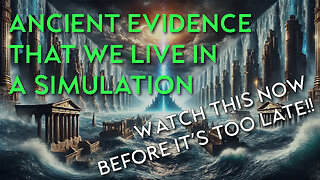Creation In Symphony The Model Part 6 Day 4 (Dr. Carl Baugh)
There is an active and vigorous debate amongst creation researchers as to the order of events as God created the entire universe early in creation week. One of the most common questions asked by Christians concerning the age and size of the universe is how light could have reached the Earth in six literal days when the universe is so large. It currently takes light 13 billion years to travel from one side to the other. There are at least four competing models that address this problem, but it is yet to be determined which model most satisfactorily answers all the related observations.
1) According to special relativity, time itself is variable and depends upon the gravitational pull in the vicinity where the passage of time is being measured. Thus, a mere six days could have been passing on earth, while God was expanding the universe and billions of years were passing further out in space.
2) Space itself expanded millions of times faster than the speed of light, allowing plenty of time for light to reach the Earth in a literal six day period.
3) All of the observations of general and special relativity can be mathematically explained by allowing the speed of light to be variable. This would allow light to reach Earth from distant stars in a biblical timeframe.
4) The initial material from which God made the universe was a body of neutrons equal to the mass of the entire universe. This material would naturally expand, forming the stars and all the elements of the universe in a matter of days without the heat and timeframe required by traditional Big Bang cosmology.
Although each of these possible cosmological models has its own set of issues, they are miniscule compared with the enormous issues surrounding the Big Bang cosmology. For instance:
The Big Bang does not work without the assumption of an initial expansion rate one hundred trillion trillion times faster than the speed of light (commonly call the “inflation period” of the Big Bang). Nobody has ever observed such an expansion or explained why or how it could happen or what slowed it down. It is just assumed to be true because, without it, the Big Bang does not work.
Stars and galaxies cannot form from hydrogen gas and have never been seen to form. Gases expand; they do not coalesce together. So, it is assumed that 95% of all the matter and energy in the universe is a mathematical convenience called “dark matter and dark energy.” This invisible construct has never been observed, measured, nor seen – it is just assumed to exist because without it, the Big Bang does not work.
A consequence of the Big Bang is that half of all material created at the beginning should be antimatter. Yet, all matter we see and measure is “real matter.” Thus, experiments show that the processes that supposedly made everything do not match everything we measure and observe. This problem is simply ignored.
The most basic observable and testable law of science continuously confirms that matter and energy can never pop into existence. Nothing produces nothing, yet the Big Bang ignores this and has to assume that everything came from nothing.
The constants of the universe are PERFECTLY tuned. To explain the universe as it now exists based on a Big Bang explosive expansion requires a total mass that could not be changed by even the weight of a single grain of sand. This is so incredible to researchers that the most common solution amongst cosmologists is to believe we are just one of an infinite number of unobservable universes, and since the number of universes out there is infinite, every possible variation is guaranteed. This nonsense is accepted as science because without believing in this, the Big Bang is untenable.
By leaving God out of their thinking and seeking to become wise without acknowledging God has been involved in creation, modern scientists have become fools.
[They] forgat his works, and his wonders that he had shewed them.
~ Psalm 78:11
Video Credit: Creation Evidence Museum
Articles and Devotions on Biblical Cosmology
http://www.creationevidence.org/blog/tag/cosmology/
-
 1:22:30
1:22:30
Talk Nerdy 2 Us
10 hours agoData Leaks, Hack Attacks & the Rise of Cyber Spies: Is Your Security Already Compromised?
79.9K20 -
 1:26:38
1:26:38
Kim Iversen
13 hours agoThe Shocking Reasons Behind Society's Moral Decay. Why Our World is Falling Apart | James Arthur & Bersabeh Ray
97.4K92 -
 58:13
58:13
Man in America
16 hours agoErasing Our God Gene: Is THIS Big Pharma's Dark Agenda? w/ Tom Renz
80K80 -
 1:30:46
1:30:46
Glenn Greenwald
14 hours agoBeirut Bombing: Is There Any Limit On Civilian Deaths? Interview With Harvard Grad Alleging Campus Antisemitism | SYSTEM UPDATE #343
107K197 -
 4:51:46
4:51:46
Nerdrotic
15 hours agoRings of Power HATES Tolkien, Agatha FLOPS, The Penguin ROCKS - Friday Night Tights #321 YellowFlash
161K62 -
 1:29:19
1:29:19
Roseanne Barr
12 hours agoNicole Shanahan Is BASED AF | The Roseanne Barr Podcast #67
94.9K114 -
 3:12:47
3:12:47
I_Came_With_Fire_Podcast
11 hours agoLive Fire (No Exercise)
59.2K11 -
 1:31:58
1:31:58
Flyover Conservatives
1 day agoTrump Train Triumphs over Biden-Harris Lawfare! - Joeylynn Mesaros; Weak Men and the Threat to Our Nation’s Security - Chris Rodack | FOC Show
62.2K14 -
 1:26:59
1:26:59
Hathor Studios
22 hours agoCode 12 — The Movie
78.8K39 -
 1:15:59
1:15:59
JoBlo Originals
11 hours agoFriday Night Flicks!
53.5K